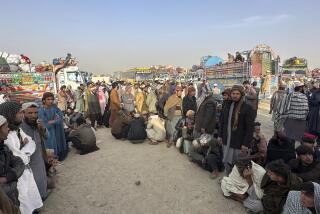Taliban Calls Man Who Died in Custody U.S. Spy
- Share via
QUETTA, Pakistan — A man who died over the weekend and was labeled an American spy by the Taliban lived for more than five months in this southwestern Pakistani city during the past year, according to the manager of a small hotel here.
The man, who went by the Pakistani name Mazhar Ayub Khan, was arrested last week in Spin Buldak, an Afghan border town about 60 miles northwest of here, according to the Taliban.
He was taken to the Afghan city of Kandahar for interrogation and died on Sunday, according to Taliban officials. The Taliban said that under questioning the man said his real name was John Bolton.
The cause of death was kidney failure, some Taliban officials said.
“He was arrested in Spin Buldak, where he passed himself off as a Pakistani man,” Abdul Salam Zaeef, the Taliban’s ambassador to Pakistan, said Monday. “He was jailed in Kandahar, where he became ill. He was taken to the hospital and he died in the hospital.”
Taliban Education Minister Amir Khan Muttaqi told the Associated Press in a telephone interview from Kandahar that Bolton was from California and had entered Afghanistan as a relief worker. He did not give Bolton’s age or hometown.
But on Monday, the man’s true identity and what he was doing in Afghanistan were still unclear.
In Washington, State Department spokesman Richard Boucher said the U.S. government knows nothing of the case and has no evidence that any Americans have been captured by the Taliban, other than two aid workers who were detained before Sept. 11 on charges of preaching Christianity.
“Thus far we’ve seen no evidence that would back up the various press reports and Taliban claims over the past couple weeks of various Americans detained,” Boucher said. “We are working with our embassy in Islamabad [the Pakistani capital] and with international agencies . . . to determine if there’s any truth at all to these reports.”
Aid organizations in the region, such as those from the United Nations, also said they had never heard of John Bolton or Mazhar Ayub Khan. And so far no relatives have come forward.
Truth About Story Hard to Discern
It is difficult to know which elements of the Taliban story are true because the regime’s statements regarding the war have proved wrong in the past. However, it does appear that someone using Khan’s name was here beginning about a year ago.
The portrait of the man, which was offered by Azmat Khan, the apparently unrelated manager of the Maryton hotel, only added to the mystery. Mazhar Ayub Khan was a gregarious man who joked and spent time with the hotel staff, joining them to cook and eat a weekly meal and often stopping to talk, said the hotelier.
The guest, however, also could become angry. His room, No. 8 on the second floor, still has a broken windowpane where he put his fist through the glass in a fit of rage, Azmat Khan said.
The visitor told hotel staff that he had been a major in the U.S. Navy, although the rank does not exist in that service. He spoke fluent Punjabi and broken Urdu, two languages used in Pakistan. He told people that his father was Pushtun, the dominant ethnic group in Afghanistan, and that his mother was from Kashmir, a region claimed by Pakistan and India.
He arrived at the hotel Nov. 15 and left April 30, saying he was headed for the Pakistani port city of Karachi and then on to the U.S. to get his family and bring it to Quetta.
“He was a good friend,” said Khan, the hotel manager. “He was a very happy person and laughed with people. I loved his smile, and he showed me pictures and told me stories about his family in America.”
Compounding the confusion, his body, which was supposed to be delivered Monday by the Taliban to Red Cross officials here, did not appear as expected. By evening, there were various reports about the reasons, but it seemed probable that the Taliban might keep the body for a few more days.
One Taliban official even suggested that the body was going to be shipped--for unexplained reasons--to several cities before being transferred to Pakistan.
The International Committee of the Red Cross and the Edhi Foundation ambulance service, a Pakistani foundation, had been alerted that the body might arrive Monday. However, the Red Cross said it was reluctant to accept a body unless it was identified and someone came forward to claim it.
“What do we do with the body? We cannot bring the body and put it in the office,” said Roland Nobs, a Red Cross official in Quetta. “It’s like a parcel; you can’t take a parcel somewhere unless you have the address.”
*
Times staff writer Norman Kempster in Washington contributed to this report.
More to Read
Sign up for Essential California
The most important California stories and recommendations in your inbox every morning.
You may occasionally receive promotional content from the Los Angeles Times.













